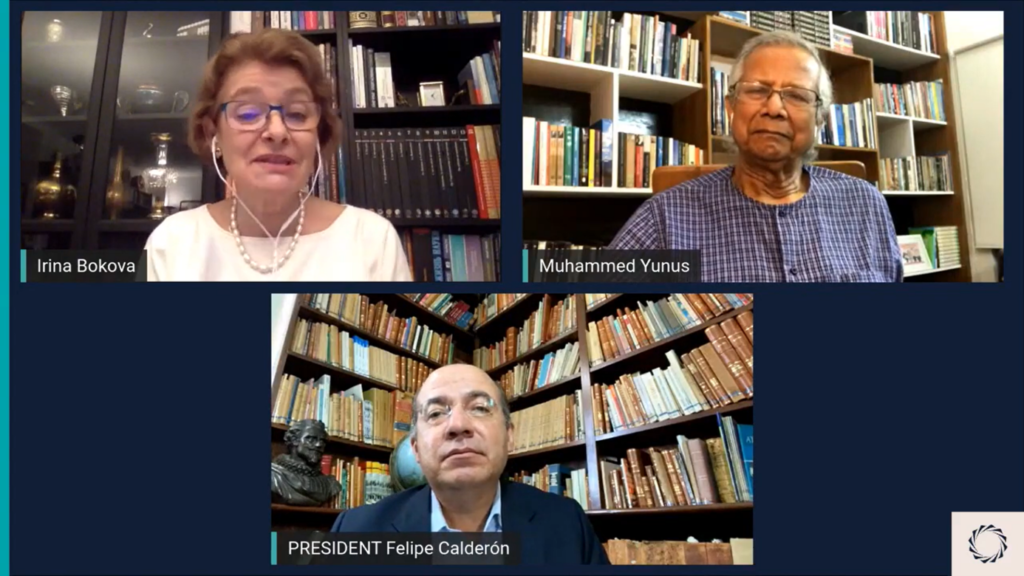Nobel Peace Prize Laureate Prof. Muhammad Yunus and former Mexican President Felipe Calderón sat down with former UNESCO Director General Irina Bokova at the 2020 Americas Summit hosted by Concordia on December 3, 2020 to discuss Innovative Approaches to Climate Change in the Americas. Among them the Yunus Environment Hub to create and promote social business examples for environmental solutions!

The year 2020 was meant to be a year of taking stock. Five years down the road from the Paris Agreement of 2015 which united all nations in their common cause to combat climate change, it was the time to evaluate the progress that had been made towards agreed-upon goals and more importantly the commitment and actions undertaken across sectors. This, as Miss Bokova points out, has been overshadowed by the current pandemic. Despite moving the focus to acutely pressing health matters it must be seen as an opportunity to create awareness around the flaws of the current system regarding environmental impacts. In doing so, current times can act as a starting point for new and innovative solutions to the climate crisis.

To realize those solutions, ex-president Calderón highlights the necessity of creating the right infrastructure framework. This includes economic incentives and investments into a green infrastructure and an end to fossil fuel subsidies as well as pricing in carbon emissions. Besides those market signals, emphasis must be put on connecting financial capital that is out there ready to be invested in sustainable projects. Something that can only be done through developing more technical capacity to make visible and implement such projects.
Bridging this gap between good intentions and inspirational ideas and technical capacity and financial capital, Calderón sees as an obligation for governments and society in general. He paints a vivid picture by quoting famous Argentinian artist Facundo Cabral. To do so, he specifically calls for investments into research and development and clean energies instead of the old, polluting system – a call that resonates with Professor Yunus.
There’s half a world waiting
With a flower in hand,
And the other half of the world
is waiting for that flower.
Facundo Cabral in his song “Con Una Flor En La Mano”
– English translation
The Nobel Peace Prize Laureate stresses the urgency of the environmental crisis. He compares it to a burning house in which we all live. Instead of taking action to put out the fire, we stay inside and celebrate our economic successes and technological advancements. By continuing this metaphorical party, we choose to ignore the self-destructiveness of it. Thereby disregarding climate change. He believes the current pandemic, in which pollution has gone down as many businesses stopped operating, to be an opportunity to abandon the old ways which caused these flames. It is upon every one of us to be conscious of our responsibility. As citizens when opening a bank account to see what the institution will do with your money or when ordering a steak at dinner. But also as businesses that need to reinvent themselves to stop environmental harm at all costs.
The Yunus Environment Hub was offered as an example of innovative approaches to this reinvention by Prof. Yunus. By leveraging the concept of social business which moves away from a profit-driven concept to one pursuing common interests, Yunus Environment Hub creates examples for business solutions which are not built to make money but to cover their costs while solving environmental problems. In this context, Professor Yunus mentions the issue of plastic recycling as a business opportunity which Yunus Environment Hub is currently pursuing in its Zero Plastic Waste Cities Program
Former President Calderón agrees that there are innovative models out there that show that the switch is feasible. He is certain that the private sector will invest into this new and green economy and accept the shift of responsibility given the right incentives. Success examples are the now competitive solar energy market, growth of electric car manufacturers like Tesla, ecotourism in Costa Rica as the fastest growing sector, or the public-private partnership in the city of Santiago de Chile now mobilizing the city through a network of several hundred electric busses.
If you want to watch the entire 30 minutes session you can find a recording here.